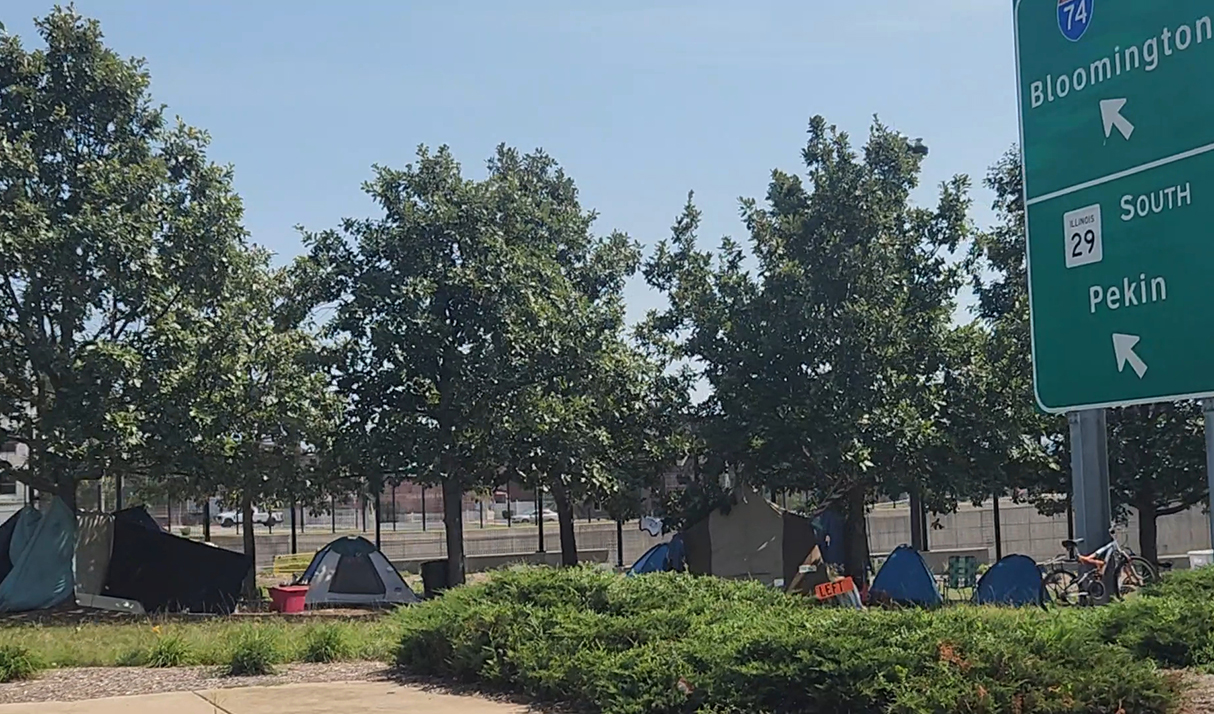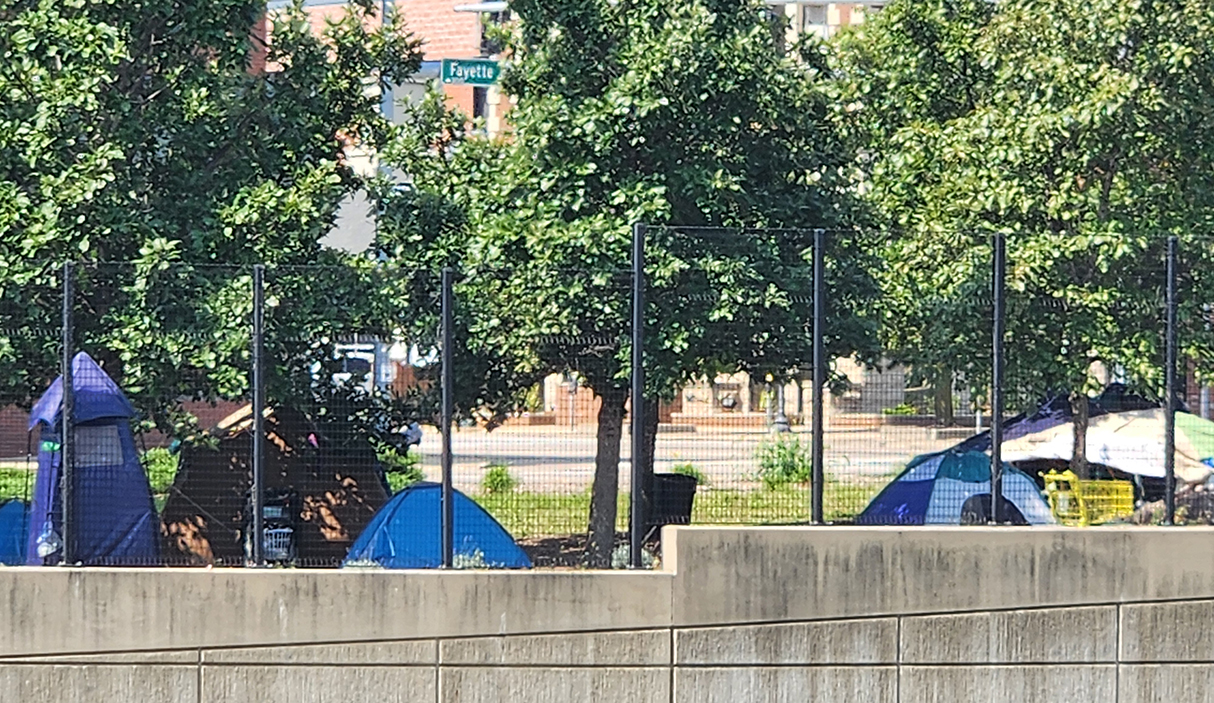
Tents at an encampment of unhoused individuals above Interstate 74 between Jefferson and Adams streets.
BRIAN LUDWIG
Advocates for Peoria’s unhoused population see a lot of problems with the city’s proposal to ban unauthorized encampments on public property.
The drafted ordinance presented to the city council last month would give Peoria the authority to remove campsites, and allow the city to issue penalties, from fines up to potential jail time.
Chris Schaffner, the executive director of the JOLT Foundation, told the council such a policy is “misguided.”
“It is a dangerous step backwards, one that betrays the core values (that) many on this council have historically championed,” said Schaffner during public comments at the council’s Aug. 13 meeting.
Seth Major, lead pastor of Reachway Church in the North Valley, also sees the plan as flawed. “Over the last four years, we have been growing in relationship and proximity to those in our community who are finding themselves unhoused,” Major said. “As a local member of clergy, my biggest concern is that all residents of Peoria are treated fairly and humanely. I took the time to read through the ordinance, and the thing that stood out to me the most was it lacked humane nuance.”
Major said that starting in April of this year, JOLT has used his church two or three days a week to provide unhoused individuals with services such as showers, meals, clothing and a safe place to be.
“In a lot of the eyes of folks in our city, unhoused folks are considered nuisances, and that is just not a way, in my mind, that people should be viewed or discussed. We do need to help those individuals, and do so in a fair and humane way,” Major said.
Kate Green is executive director of Home for All Continuum of Care, a collaboration of community partners working to design a response system to address homelessness. “What’s really difficult about this is when we look at the infrastructure around fines and fees, potential jail time, those things just don’t line up with long term, permanent housing opportunities. They really become additional barriers to housing,” Green said.
“So, if our goal is really solution-oriented and working towards ensuring that every person in our community has a safe place to sleep at night, we need to be thinking more about the solutions that we can use to address homelessness and encampments, rather than thinking that utilizing the criminal justice system is going to work for long-term housing.”
Court ordered?
Christine Kahl, CEO of Phoenix Community Development Services, said the city is moving too quickly to take action against encampments following a June decision by the U.S. Supreme Court that allows such bans.
“My first concern is just that it’s going too fast, and that there was no consultation done with, to the best of my knowledge, with the network of providers, and certainly there was no consultation done with the people who are impacted by this ordinance,” Kahl said. “So my first request was to slow this down and back up and do those steps.”
Kahl would prefer to see an aggressive plan to develop more affordable housing. Incentives could encourage landlords to accept unhoused individuals as tenants. “We receive — our community receives, as well as our agency individually receives — substantial money to do rental assistance. The problem is that it’s harder and harder to find private landlords that are willing to accept that rental assistance in this particular group of residents,” Kahl said.

Tents at an encampment of unhoused individuals above Interstate 74 between Jefferson and Adams streets.
BRIAN LUDWIG
Suitable solutions
Green said Peoria should look at innovative models from other communities to help individuals work toward long-term housing.
“We’ve seen some really great best practices emerging around more interim housing solutions,” she said. “It’s almost a mixture between emergency shelter and transitional housing, where we’re creating the space that affords dignity personal choice to individuals. It’s not forcing compliance with different service requirements or anything like that, but it does give them the space and time to think through not just survival, but actually how they can thrive.
“What’s really nice about our community is that we’re small enough that this is a challenge that we can tackle, I think, head on, as long as everybody is willing and at the table.”
Council member Zach Oyler expressed a belief that the council horseshoe is “the table” when it comes to making policy for the city. But Jessica McGhee, co-founder of LULA NFP Peoria, said any discussion on homeless camps needs a more inclusive view at the table.
“We’re currently in the process of interviewing a lot of our friends that currently live on the street, or recently lived on the street, and we’re asking them the same question,” said McGhee. “And a couple of the responses that I got were like, ‘Live out here. Just live out here and see what it’s like. Try to go to work, try to clean your clothes, try to get transportation, try to brush your teeth.’
“And then my thought is, come out on outreach with us. Meet some of the folks, understand some of the challenges that our friends are dealing with — because some of the challenges that they’re dealing with are so monumental, I’m not even sure how they’re able to get through a day.”
Visibility
LULA provides supplies and assistance to those experiencing homelessness.
“I don’t think banning encampments stops people from being homeless, or even stops them from having encampments. I think that what they do is just try to be less visible — and we see that in our experience, and we’ve been doing active outreach for a long time,” McGhee said.
“So when people are less visible, my point is that they’re harder to find, which means we can’t get them on housing lists. We can’t talk to them about medical options. We can’t talk to them about treatment options. We can’t talk to them about, if they have a substance use disorder, about proper disposal of needles. We can’t help them if we can’t find them.”
Kshe Bernard is LULA’s other co-founder and the director of Outreach Services for JOLT. She said the consideration of a ban on encampments serves as a call to action.
“I think this is going to be a long road, because we’re divided; the council meeting kind of showed that,” Bernard said. “But I, for one, would love to see sanctioned encampments where all the service providers — that’s housing, that’s medical, that’s any type of service provider — can go, and we would hopefully be able to mitigate those sanitation and health risks.
“But realize that these are people. There’s so many myths surrounding people experiencing homelessness: that they don’t want resources, they don’t want shelter. I have had the great honor and privilege to work closely with them for five years — that’s not true. It just isn’t, it’s patently false.”
Many of the advocates specifically objected to council member Chuck Grayeb’s profession of “nothing but compassion for the people who are unhoused and who are living like animals outside. Like animals; yes, like animals.”
Major said he finds that characterization discouraging and misinformed. “That hurts, because he’s talking about my neighbors and he’s talking about people that I call ‘friend,’ that know my name and I know their name,” Major said. “That told me that he might not be interested in thinking creatively and he might not be interested in trying to find solutions outside of that ordinance.”
Bernard said moving unhoused people out of campsites won’t resolve the problems.
“Just because you can’t see them doesn’t mean that those issues go away. You can’t sweep it under the rug. These are humans; these are humans with no other options and no other resources,” she said. “And for the people who feel uncomfortable seeing encampments — good. I want you to sit in that uncomfortableness and realize that we need resources and not shame.”
Bernard fears a complete ban on campsites could result in the most dire of consequences
“We’re going to lose people,” she said. “When people get to stay in community together, we know where to deliver services. But maybe even more importantly, if there’s an incident, you’re not alone; somebody might have a phone or if they don’t have a phone, they can run and get EMS or whatever they need.
“But when you force people to disband and hide and they’re alone, that’s how people die. That’s how we lose them.”

3 comments for “WCBU: City stance on encampments ‘Dangerous step backwards’”
Recent Comments
This is what the city of Peoria does they act 1st take no responsibility for their actions and they blame homeless people for incidents but if they would provide portabale toilets and have them cleaned every day they wouldn’t be living in filth
I agree you can’t help if you can’t find them. That is exactly what will happen when you break up encampment. These need compassion they need help. Help from everyone , serious help. .Ernest help no people looking to make a name . Substandard abuse is real .It looks like everyone is trying to keep you down. You can’t afford housing .You deposits and rent are more than they can pay. HELP REAL HELPShow them you are willing to help just might change some bodies might if they can see it not a loosing battle.
Very dangerous step backward. I love the comment made to those who ‘feel uncomfortable’ viewing encampments:Good! I want you to sit in that feeling and realize we need resources, not shame. Words to that effect.
It seems to me that certain animals, eh, humans prefer this: ‘Out of sight is out of mind’. Hmmmph.